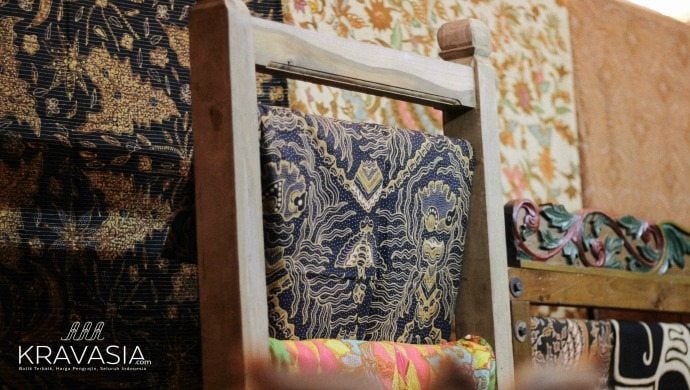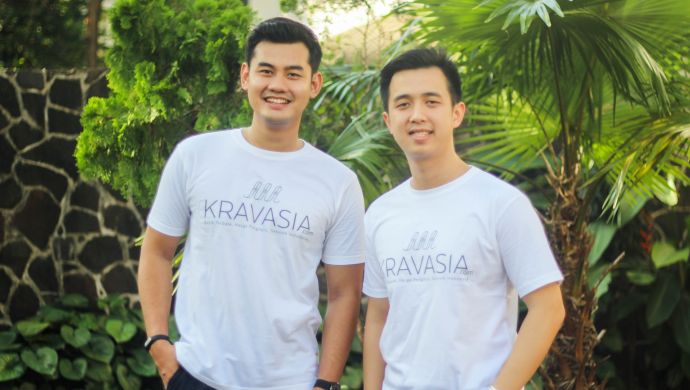Though Kravasia will begin by focussing on local market first, it aims to eventually reach Asian market

When Maulana Muhammad and Ignasius Ryan Hasim went to visit Kampung Batik (“Batik Village”), a traditional garment industry centre in Central Java, they learned about the challenges faced by the industry.
Despite having a relatively secure position in the local market, as Indonesians use batik as everything from school uniform to casual wear, many small businesses are struggling in building a strong online presence in the country’s highly competitive e-commerce scene.
“Apparently, two biggest problems that they face are the complexity of developing the online presence of their business due to limited access of information and lack of promotion activities for their products,” Hasim says.
The two friends then went on to start Kravasia, a curated online marketplace for fashion products made of printed and hand-drawn batik and tenun, an umbrella term for the different kinds of traditionally made Indonesian fabrics. The platform was launched in World Batik Day on October 2.
Also Read: Indonesian fashion e-commerce Berrybenka confirms lay-off
What can Kravasia offers to manufacturers and customers that cannot be found in other online marketplaces such as Tokopedia or Bukalapak? Or perhaps even online marketplace for traditional Indonesian handicrafts Qlapa?
“There are a lot of e-commerce websites in Indonesia but there is no single e-commerce player that really focusses on batik and tenun. We aspire to be the best marketplace in Asia for batik, tenun and any other craft products by curating both the vendors and the products to provide the best shopping experience for customers. It is always about quality over quantity,” Muhammad explains.
He also explains that Kravasia is providing batik artisans with three services.
“First, we provide training and education for each of the artist to have standardised product photoshoot, the way the customers wanted them to. Second, we also nurture our artists to grow their business with us by giving business consultation on product model and quality, and help them organise their business more efficiently,” Muhammad says.
“Last, we also help them to access bigger market in domestic and international by support them with digital marketing services for their product,” he finishes.
Also Read: MNC Group branches into fashion e-commerce with BrandOutlet
Though Kravasia wants to eventually reach the Asian market, for the time being it wishes to focus on domestic market. And the prospect seems to be promising; in 2015, batik, tenun, handicrafts, and other creative industry products contributed IDR642 trillion (US$49 billion) to the economy or equal to seven per cent of the total Indonesian GDP.

Kravasia founders Maulana Muhammad (left) and Ignasius Ryan Hasim. Image Credit: Kravasia
Prior to starting Kravasia, the founders had experience working in FMCG companies such as Nutrifood and Procter & Gamble, and tech giant Microsoft Indonesia.
The founders were also part of the team that developed Ruangguru, a leading edtech startup in Indonesia, in its early days.
Also Read: Promising Indonesian e-commerce platform SaleStock lays off “hundreds”
“As Product Manager for two core business units –private tutor marketplace and mobile app– I helped Ruangguru grow from 9-10 people to almost 70 people since [Ruangguru Chief Products Officer] Iman Usman invited me to join,” explains Muhammad, who went to University of Indonesia with Usman.
When asked about the most valuable lessons that they have got during their time at the company, Muhammad reveals that there are three that Kravasia founders are applying in their new ventures.
“First is to always build product from the minimum viable product (MVP) or prototype with the least effort to validate the concept and idea. Second is to build strong company culture to enhance company productivity and employee happiness,” he says.
“Third is try to figure out the potential profitable mechanism since from the start to make sure of the business’ sustainability,” he concludes.
Kravasia is currently run by a team of 10 employees and it is planning to double its headcount by end of year. Still bootstrapping its business, the company is currently in talks with several potential investors.
Also Read: 6 fashion startups that actually deliver value
“We started Kravasia very lean to validate the idea and market,” Muhammad says.
In the near future, Kravasia wants to focus on on-boarding different types of batik from all Indonesian regions by listing more brands and artisans in its platform. It will also gather customer and vendor feedbacks to prepare the launch of its v.02 site, as well as its mobile app.
The post Ruangguru alumni start new curated online marketplace for batik products appeared first on e27.